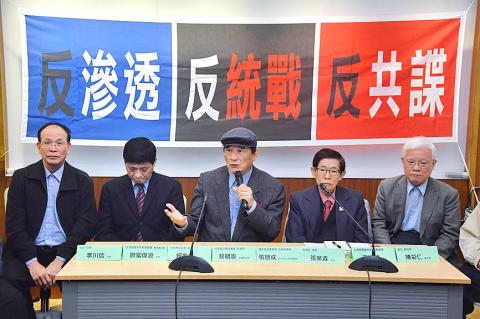Former ministry of national defense Michael Tsai (蔡明憲) yesterday called for greater caution against Beijing’s infiltration, saying that high-level Chinese Communist Party (CCP) officials had tried to establish contact with him months after he left office in May 2008.
“China’s infiltration programs target not only the Chinese Nationalist Party [KMT] and the media, but also people in the pan-blue camp and even those in the Democratic Progressive Party [DPP] and the pan-green camp,” Tsai told a news conference in Taipei.
A Taiwanese entrepreneur doing business in China had relayed a message to him from China’s Taiwan Affairs Office (TAO), he said.

Photo: CNA
“The TAO wanted to invite me to attend an international conference in China and they said I would be received by the leader of the CCP,” he said.
“I thought that was very strange because I had stepped down less than eight months ago. So I firmly refused,” Tsai said.
While self-confessed Chinese spy William Wang Liqiang’s (王立強) stories about China’s intelligence operations in Taiwan have brought more attention to the subject, the discussions have only touched the tip of the iceberg, he said.
The National Security Council in September said that China had been using all possible means to influence the Jan. 11 elections and proposed five countermeasures, so “I hope President Tsai Ing-wen’s (蔡英文) national security team would fully implement those measures,” Tsai added.
The DPP caucus’ version of an anti-infiltration bill, which stipulates a prison term of up to seven years or a fine of NT$5 million (US$163,866) for those who act on behalf of “foreign forces” to disrupt social order, and bans political donations and other political activities under the instructions of such forces, advanced to a second reading on Friday.
The KMT had previously obstructed the bill, but is now proposing an alternative, which would prevent the “annexation of the Republic of China.”
The KMT boycotted the legislative meeting on Monday last week to “prevent the DPP from posting the voting results online and portraying the KMT as siding with Beijing on Chinese interference,” KMT Legislator Alicia Wang (王育敏) said on Friday.
Meanwhile, Taiwan Association of University Professors president Lai Cheng-chang (賴振昌) said “the biggest national security problem” is that the government has to deal with groups of Taiwanese who support the CCP from within the nation.
For example, when Wang’s allegations were first reported, many in the pan-blue camp took the same stance on his claims as the CCP’s, Lai said.
The Reverend Omi Wilang, a Presbyterian minister, said the CCP has been trying to win the hearts of Taiwanese religious groups even as it cracks down on religious freedom in China.
“We strongly condemn the way in which the CCP has been tearing down churches and temples in China while inviting Taiwanese religious groups to China and offering them special treatments,” he said. “The two-faced approach is also part of its tactic to promote unification.

MAKING WAVES: China’s maritime militia could become a nontraditional threat in war, clogging up shipping lanes to prevent US or Japanese intervention, a report said About 1,900 Chinese ships flying flags of convenience and fishing vessels that participated in China’s military exercises around Taiwan last month and in January last year have been listed for monitoring, Coast Guard Administration (CGA) Deputy Director-General Hsieh Ching-chin (謝慶欽) said yesterday. Following amendments to the Commercial Port Act (商港法) and the Law of Ships (船舶法) last month, the CGA can designate possible berthing areas or deny ports of call for vessels suspected of loitering around areas where undersea cables can be accessed, Oceans Affairs Council Minister Kuan Bi-ling (管碧玲) said. The list of suspected ships, originally 300, had risen to about

DAREDEVIL: Honnold said it had always been a dream of his to climb Taipei 101, while a Netflix producer said the skyscraper was ‘a real icon of this country’ US climber Alex Honnold yesterday took on Taiwan’s tallest building, becoming the first person to scale Taipei 101 without a rope, harness or safety net. Hundreds of spectators gathered at the base of the 101-story skyscraper to watch Honnold, 40, embark on his daredevil feat, which was also broadcast live on Netflix. Dressed in a red T-shirt and yellow custom-made climbing shoes, Honnold swiftly moved up the southeast face of the glass and steel building. At one point, he stepped onto a platform midway up to wave down at fans and onlookers who were taking photos. People watching from inside

Japan’s strategic alliance with the US would collapse if Tokyo were to turn away from a conflict in Taiwan, Japanese Prime Minister Sanae Takaichi said yesterday, but distanced herself from previous comments that suggested a possible military response in such an event. Takaichi expressed her latest views on a nationally broadcast TV program late on Monday, where an opposition party leader criticized her for igniting tensions with China with the earlier remarks. Ties between Japan and China have sunk to the worst level in years after Takaichi said in November that a hypothetical Chinese attack on Taiwan could bring about a Japanese

The WHO ignored early COVID-19 warnings from Taiwan, US Deputy Secretary of Health and Human Services Jim O’Neill said on Friday, as part of justification for Washington withdrawing from the global health body. US Secretary of State Marco Rubio on Thursday said that the US was pulling out of the UN agency, as it failed to fulfill its responsibilities during the COVID-19 pandemic. The WHO “ignored early COVID warnings from Taiwan in 2019 by pretending Taiwan did not exist, O’Neill wrote on X on Friday, Taiwan time. “It ignored rigorous science and promoted lockdowns.” The US will “continue international coordination on infectious